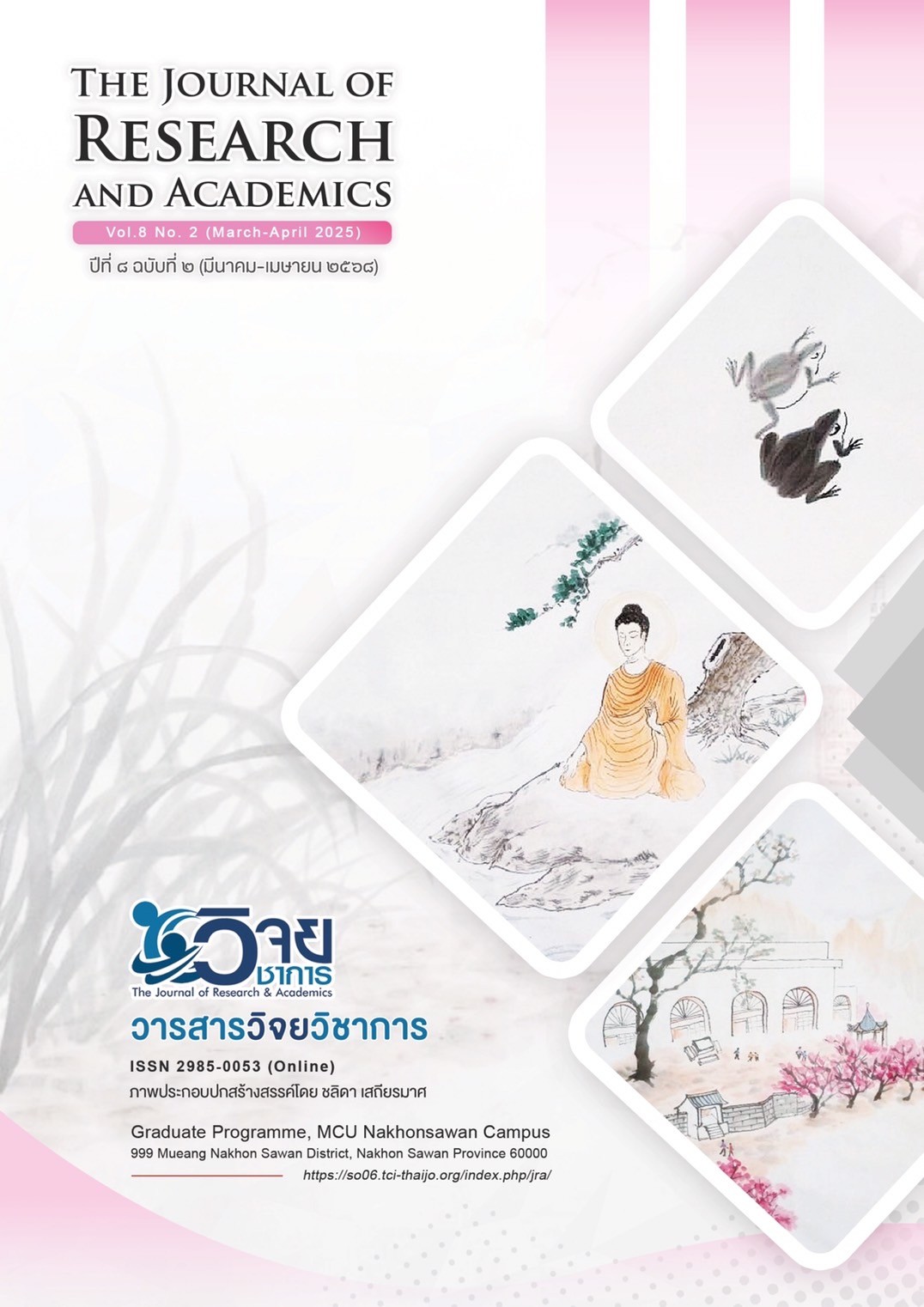การพัฒนากิจกรรมการฝึกอบรมแบบผสมผสานเพื่อพัฒนาความสามารถการเขียนบทความวิจัยและการนำเสนอผลงานวิจัยสำหรับครู
Main Article Content
บทคัดย่อ
บทความวิจัยครั้งนี้มีวัตถุประสงค์เพื่อ 1) พัฒนากิจกรรมการฝึกอบรมแบบผสมผสานที่มุ่งเน้นการเสริมสร้างความสามารถในการเขียนบทความวิจัยและการนำเสนอผลงานวิชาการของครู 2) เปรียบเทียบระดับความรู้ของครูก่อนและหลังการเข้าร่วมกิจกรรมการฝึกอบรมแบบผสมผสาน 3) ศึกษาความสามารถในการเขียนบทความวิจัยและการนำเสนอผลงานวิชาการของครูภายหลังการเข้าร่วมกิจกรรมการฝึกอบรม และ 4) สำรวจระดับความพึงพอใจของครูที่เข้าร่วมกิจกรรมการฝึกอบรมแบบผสมผสาน เป็นการวิจัยเชิงพัฒนา กลุ่มตัวอย่างประกอบด้วยครู 60 คน เครื่องมือวิจัยได้แก่ แผนกิจกรรมการฝึกอบรมแบบผสมผสาน สื่อประกอบการฝึกอบรม แบบวัดความรู้ก่อนและหลังการฝึกอบรม แบบประเมินการเขียนบทความและการนำเสนอ และแบบสอบถามความพึงพอใจของผู้เข้าร่วม กิจกรรมการ การวิเคราะห์ข้อมูลใช้ค่าเฉลี่ย ส่วนเบี่ยงเบนมาตรฐาน และการทดสอบค่าที ผลการวิจัย พบว่า 1) กิจกรรมการฝึกอบรมแบบผสมผสานมีคุณภาพอยู่ในระดับเหมาะสมที่สุด 2) ผู้เข้ารับการฝึกอบรมมีความรู้หลังการฝึกอบรมสูงกว่าก่อนการฝึกอบรมอย่างมีนัยสำคัญทางสถิติ (p < .05) 3) ความสามารถในการเขียนบทความและการนำเสนออยู่ในระดับดี และ 4) ความพึงพอใจต่อการฝึกอบรมอยู่ในระดับมากที่สุด ผลลัพธ์ดังกล่าวแสดงให้เห็นถึงประสิทธิภาพของกิจกรรมการฝึกอบรมแบบผสมผสานในการพัฒนาทักษะและสร้างความพึงพอใจแก่ครู
Article Details

อนุญาตภายใต้เงื่อนไข Creative Commons Attribution-NonCommercial-NoDerivatives 4.0 International License.
1. เนื้อหาและข้อมูลในบทความที่ลงพิมพ์กับวารสารวิจยวิชาการ ถือเป็นข้อคิดเห็น และความรับผิดชอบของผู้เขียนบทความโดยตรงซึ่งกองบรรณาธิการวารสารไม่จำเป็นต้องเห็นด้วย หรือร่วมรับผิดชอบใด ๆ
2. บทความ ข้อมูล เนื้อหา รูปภาพ ฯลฯ ที่ได้รับการตีพิมพ์ในวารสารวิจยวิชาการ ถือเป็นลิขสิทธิ์ของวารสารวิจยวิชาการ หากบุคคลหรือหน่วยงานใดต้องการนำทั้งหมดหรือส่วนหนึ่ง ส่วนใดไปเผยแพร่ต่อหรือเพื่อการกระทำการใด ๆ จะต้องได้รับอนุญาตเป็นลายลักษณ์อักษรจากวารสารวิจยวิชาการก่อนเท่านั้น
เอกสารอ้างอิง
นวลอนงค์ จันทร์สุข และสุวิมล ว่องวาณิช. (2563). การพัฒนาหลักสูตรเสริมสร้างสมรรถนะการวิจัยในชั้นเรียนด้วยการวิจัยเป็นฐานสำหรับครูประถมศึกษา. วารสารวิชาการศึกษาศาสตร์ มหาวิทยาลัยศรีนครินทรวิโรฒ, 21(1), 85-100.
สุวิมล ว่องวาณิช และคณะ. (2560). การพัฒนาชุดการเรียนรู้เพื่อส่งเสริมทักษะการวิจัยในชั้นเรียนของนิสิตครู. (รายงานการวิจัย). ศูนย์นวัตกรรมการเรียนรู้ คณะครุศาสตร์ : จุฬาลงกรณ์มหาวิทยาลัย .
Bernard, R. M., Borokhovski, E., Schmid, R. F., Tamim, R. M. & Abrami, P. C. (2014). A meta-analysis of blended learning and technology use in higher education: From the general to the applied. Journal of Computing in Higher Education, 26(1), 87–122.
https://doi.org/10.1007/s12528-013-9077-3
Garrison, D. R. & Vaughan, N. D. (2008). Blended learning in higher education: Framework, principles, and guidelines. San Francisco, CA : Jossey-Bass.
Graham, C. R., Borup, J., Pulham, E. & Larsen, R. (2022). The effectiveness of blended learning in professional development: A meta-analysis. Journal of Technology and Teacher Education, 30(1), 89–105. https://doi.org/ 10.1007/s12528-021-09293-3
Graham, C. R., Woodfield, W. & Harrison, J. B. (2019). A framework for institutional adoption and implementation of blended learning in higher education. The Internet and Higher Education, 18(1), 4-14. https://doi.org/ 10.1016 /j.iheduc.2012.09.003
Hew, K. F. & Lo, C. K. (2018). Flipped classroom improves student learning in health professions education: A meta-analysis. BMC Medical Education, 18(1), 1-12. https://doi.org/10.1186/s12909-018-1144-z
Lim, C. P. & Morris, M. (2022). Designing blended learning environments for academic success: A meta-analysis. Educational Technology Research and Development, 70(3), 561-582. https://doi.org/10.1007/s11423-021-10083-7
Poon, J. (2018). Blended learning: An institutional approach for enhancing students' learning experiences. Journal of Online Learning and Teaching, 14(1), 102-117. https://doi.org/10.24059/olj.v14i1.1823
Vygotsky, L. S. (1978). Mind in society: The development of higher psychological processes. Cambridge, MA. : Harvard University Press.


